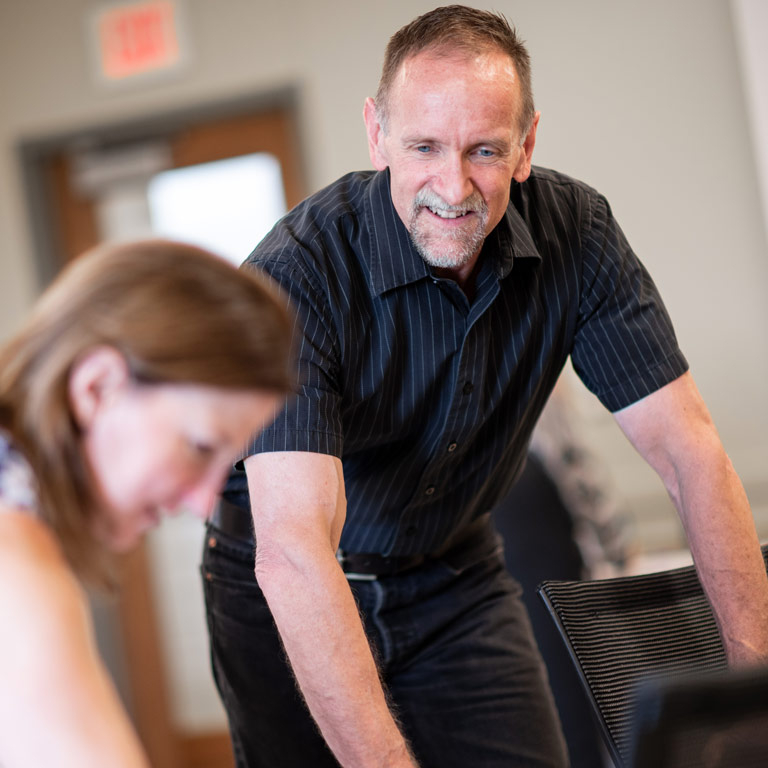Interested in trying a new instructional strategy, but not quite sure how? Want to energize your lectures with active learning, but need some help with methods? Frustrated with distracted students despite your best efforts to engage them? Instructional Consulting at the Kelley School of Business assists faculty members at every level in all matters pertaining to the teaching mission of the school.
Hone your teaching with one-on-one guidance


Instructional consultant Eric Metzler can meet with you once, several times, or on an ongoing basis to collaborate on any aspect of your teaching you wish to discuss, hone, or remediate. Meetings take place in a comfortable, private setting, where clients are welcome to discuss any matter pertaining to their teaching responsibilities with assurance that the discussion will remain confidential. Set up a meeting
Benefit from a sounding board
The services we offer are broad and flexible, and consultations vary in structure according to your specific needs. Eric can help to brainstorm new ideas, offer suggestions and tips based on current research, or assist in diagnosing and solving a problem or group of problems.
If you desire, Eric can also visit your classroom one or more times to observe teaching in action in order to offer suggestions that address specific issues. This work is always driven by the goals of the faculty member, beginning with a pre-observation discussion to determine specific needs, followed by the observation at a mutually convenient time, and finally the follow-up consultation to debrief the observation and discuss specific pedagogical improvements or developments.
Our consulting services fall into the following categories:
Course planning and development
- Determining goals, assessments, and structure of course using backward course design
- Preparing a syllabus
- Instructional guidance
- Ensuring students prepare for class
- Delivering interactive lectures
- Leading productive discussions
- Planning meaningful assessments, assignments, and tests
- Grading student work and rubric development
Instructional diagnosis
- Understanding how course evaluations work
- Interpreting the data from one’s course evaluations
- In-class observation with follow-up consultation (see details above)
- In-session feedback on instruction from students (instructor absent from classroom)
Special issues
- Handling academic misconduct
Faculty growth
- Writing a philosophy of teaching statement
- Documenting your in-class observation and follow-up consultation
Make sense of student evaluations
Student evaluations of teaching (SETs) can offer instructors useful feedback about their courses, curricula, or instructional practices, but they can also be difficult to interpret or make use of, especially when shrouded in students’ inexpressive or unprofessional language and when numerical data seem like a hopeless jumble of numbers.
Eric is happy to help interpret your SETs. After studying your data, he can help you recognize what your students identify as the strengths of your course, curriculum, or teaching and also help you see the aspects of these that students believe could be improved. If you wish, you can collaborate to address some of the feedback offered by your students.
Get support for course planning and development
If you are designing a new course or revising an existing one, Eric can assist you in articulating goals and learning outcomes for your course, followed by assignment design and semester planning and finishing with the insertion of content.
Also, consider signing up for one of several course development institutes offered through IU’s Center for Innovating Teaching and Learning. These are structured in various ways (e.g., intensive 8-day sessions to once-a-month sessions over the course of a semester), oriented toward different types of classes (e.g., small-to-medium classes to large classes), and offered throughout the year.
Working with a cohort of colleagues, you will create your new course using the principles of backward course design, insights from Decoding the Disciplines, the structure of guided conversations, and time-tested classroom activities. Throughout, you will learn about learner-centered pedagogy and experience teaching strategies that you will be able to use in the classroom.